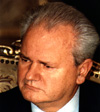
Please support
this campaign

|
Of course, that popularity owes much to the fact that the Milosevic regime has maintained a virtual stranglehold on the country's major media for more than a decade; in that time average Serbs have not been exposed to anything resembling a balanced — let alone minimally factual — account of developments in their region.
(Lawrence Weschler, Mind Sets: Beyond Victimhood, The New Yorker, 12Apr99, p. 25) |
|
Slobodan Milosevic and his cohort bear the overwhelming responsibility for fomenting the calamity we are now witnessing. In a cynical grab for power, and through the expert use of propaganda and other fascist methodologies, they whipped the people into a frenzy.
(Lawrence Weschler, Mind Sets: Beyond Victimhood, The New Yorker, 12Apr99, p. 25) |
|
Yugoslavia's President Slobodan Milosevic Suppression of the press through intimidation, assault, crippling fines, and license denials — all codified in a draconian media law imposed in October — is a prime weapon in Milosevic's arsenal of control. Intensified with the onset of the NATO bombardment, Milosevic's repression of all independent media has quelled every opposition voice, imperiled journalists' lives, and filled the airwaves with hate speech. http://www.cpj.org/enemies/Frame99.html |
 |
|
This kind of fascism draws most of its strength from a sense of historical grievance and of the nation-as-misunderstood-victim — a national self-pity zealously husbanded, nurtured, and sustained from one generation to the next in a process that often seems to verge on the pathological. This is what we seem to be dealing with in Serbia, a country whose overriding foundation myth, far from celebrating a triumph, glorifies a six-hundred-year-old botched defeat, one that continues to cry out for vengeance. (Lawrence Weschler, Mind Sets: Beyond Victimhood, The New Yorker, 12Apr99, p. 25) |
|
It's not as though people in this region have historically been incapable of living together. Through most of their history they did just that; the rate of ethnic intermarriage in cities like Sarajevo was almost a third in the last years before the war. Rather, it's that to the extent that they thought of themselves as Serbs or Croats or Kosovars or Bosnian Muslims — or suddenly started thinking of themselves that way all over again — their core identity arrived pickled in the brine of historic victimhood. Once they got started, these people were not only unable to forget the past; they could scarcely think of anything else. Grievances half a century and even half a millenium old remained so vivid that, as was occasionally noted, it was as if the living had been transformed into shades haunting the far more substantial ghosts of the distant past, rather than the other way around.
(Lawrence Weschler, Mind Sets: Beyond Victimhood, The New Yorker, 12Apr99, p. 25) |
|
Obviously, a man's judgment cannot be better than the information on which he has based it. Give him the truth and he may still go wrong when he has the chance to be right, but give him no news or present him only with distorted and incomplete data, with ignorant, sloppy or biased reporting, with propaganda and deliberate falsehoods, and you destroy his whole reasoning processes, and make him something less than a man.
(Arthur Hays Sulzberger, Adress, New York State Publishers Association, August 30, 1948, in Bartlett's Familiar Quotations, 1968, p. 1020a-1020b) |